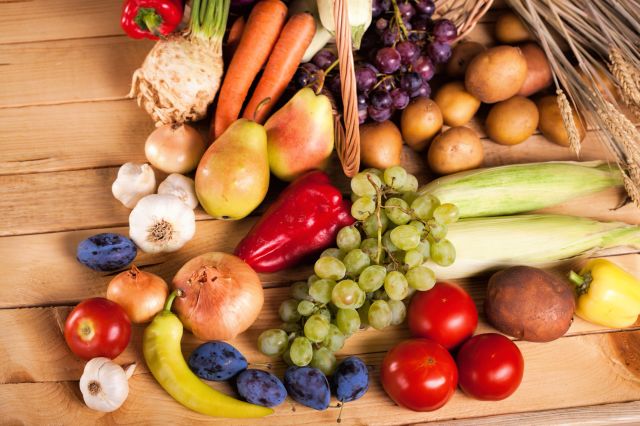Fresh fruit and veggies come packed with vitamins, minerals, and phytochemicals. Or do they? Turns out it might depend on how you treat them. And no doubt you've wondered if you could be doing your produce pals some kind of disservice in the journey from the grocery store to your stomach.
Does microwaving really zap vitamins and minerals? Is it better to buy fresh instead of frozen? Is your body able to absorb all the good-for-you nutrition, anyway?
Here are answers to your nutrition questions and a few simple steps to help you get the most from your produce-packed meals.
Fresh vs. Frozen
Q. I've always thought fresh is best when it comes to fruit and vegetables, but now my daughter tells me frozen foods have more nutrients. Who's right?
A. You're both right. It's true that fresh fruit and vegetables tend to taste better and have more nutritional value than frozen or canned. But that's not always the case.
Fresh is best when it really is farm-fresh and ripe. But many commercial fruits and veggies are picked before peak ripeness -- which also means before their nutritional peak -- to avoid spoilage during transport and storage. And just a few days after harvest, fruits and vegetables begin to lose some of their nutritive goodness. What's more, the longer they sit on the shelf -- during transport, in the supermarket, and in your fridge -- the fewer nutrients they have left to pass on to you.
On the other hand, vegetables and fruit intended for freezing are usually picked closer to the peak of ripeness and are flash-frozen immediately after harvest. The processing does deplete some nutrients, but it locks in the rest for up to 12 months. So in some instances, frozen fruit and veggies may actually have more of the vitamins and minerals your body needs.
Quick Tip: To help retain the highest levels of vitamin C, don't thaw frozen veggies before cooking. Studies show that vegetables cooked directly from frozen retain more vitamin C than vegetables that are thawed first.
For nutrient-rich fresh fruit and veggies, buy what's in season and grown locally. And eat it within a few days of purchase. Find your local farmers market with this list from the USDA.
To Microwave or Not to Microwave
Q. Does microwaving really zap all the vitamins and minerals from vegetables? If so, what's the best way to cook them?
A. The jury's still out on this one. Although some studies suggest the microwave is to blame for sucking nutrients out of food, others point a finger at the water in which they are cooked.
For most vegetables and fruit, any type of cooking lowers the nutrient content. So for now, a good rule of thumb is: Less is more.
- Leave skin on whenever possible. Many fruits and vegetables hold most of their antioxidants in their skins. Simply wash well before cooking/eating.
- Lightly steam vegetables instead of boiling, sauteing, or roasting. Better yet, go raw with a fresh salad.
- If you prefer to blanch your veggies, dip them into boiling water for the least amount of time possible.
The exception is the red tomato. Cooking actually increases its level of lycopene -- an antioxidant thought to help prevent certain types of cancer, heart disease, and vision loss.
Quick Tip: Drizzle your vegetables with a bit of olive oil to help your body better absorb the vitamins and minerals.
Finding Foods with Lycopene
Q. I don't like the taste of tomato sauce, but I've heard it's a good source of the antioxidant lycopene. Are there any other fruits or vegetables that contain lycopene?
A. You're in luck. Tomatoes and tomato products may be the main dietary source of lycopene for most people, but you can top off your lyco levels with other fruits, including papaya, guava, watermelon, and pink grapefruit.
Lycopene is nature's red and pink paintbrush; it's what gives those fruits their color. In people, it acts as a powerful antioxidant.
But it isn't always easy for our bodies to access lycopene. Tomatoes, for example, have relatively low levels of the antioxidant until they're cooked. Cooking increases the amount of lycopene, and adding a little olive or canola oil makes it easier for the body to absorb this healthful substance. That means cooked and processed tomato products, such as tomato sauce, tomato soup, and spaghetti sauce, are all excellent sources of lycopene. Just stick with low-sodium, low-sugar varieties of prepared tomato products.
Quick tip: Pair fresh fruit like papaya, guava, watermelon, and pink grapefruit with low-fat (rather than nonfat) yogurt or cottage cheese to help your body better absorb the lycopene.
Functional Fat
Q. I always use fat-free salad dressing to ensure I'm not loading up on extra calories. But I recently heard that full-fat salad dressing is best. How can that be?
A. It may seem counterintuitive, but it's true. Salad dressing with fat is best if you're after the antioxidants in the salad.
That's because some antioxidants, such as carotenoids found in carrots, tomatoes, spinach, and corn, need fat in order to be absorbed by your body. In one study, participants who added full-fat dressing to their salads absorbed more carotenoids than participants who used low-fat, fat-free, or no dressing. But that doesn't mean you should drench your veggies in high-fat, high-calorie dressings.
Instead, make those calories count by pairing fresh salads with a bit of healthy fat. Choose salad dressings with exclusively heart-healthy monounsaturated fats. Ones with a base of olive oil, canola oil, or even avocado are best.
Beyond Fruit and Veggies
Q. Okay, so nothing beats a fresh salad with olive oil dressing for a nutritional punch. But do I have to get all my antioxidants from fruit and veggies?
A. Nope. Dark chocolate, red wine, and nuts also offer antioxidant-like substances. They just aren't as low-cal or as good for you as produce. So consider them nice little once-in-a-while treats.
Tea and spices are other sources of antioxidants that you can load up on to your heart's content.
Quick tip: If you're looking to get the antioxidant health benefits from dark chocolate (yes, it contains heart-healthy flavonols), don't mix it with milk. Recent studies suggest that milk may interfere with the body's ability to absorb flavonols.
Give Your Body the Best Advantage
Any way you slice it, if you eat a balanced diet with lots of vegetables and fruit, you're dealing yourself a pretty good hand in the vitamins and minerals game. But by employing a few of these nutrition-boosting tricks of the trade, you can turn your nutritional full house into a royal flush.






